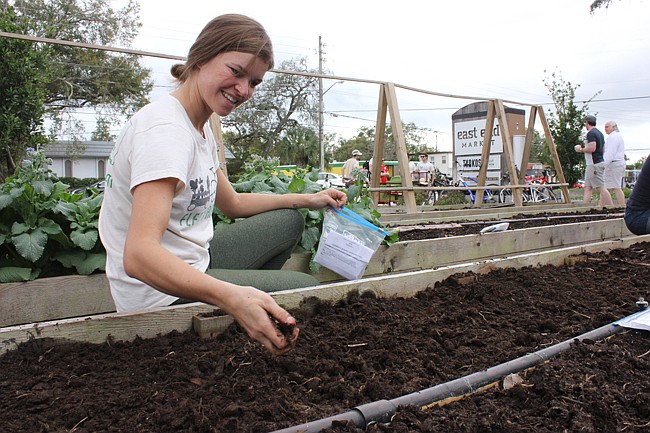- April 26, 2024
-
-
Loading

Loading

Trailer loaded, helmets on, kickstands up and it’s time to get gardening. Chris Castro leads a fleet of bikers filed two-by-two through the streets of Audubon Park, towing a trailer stacked with green bins and rakes behind his Specialized two-wheeler.
After loading up at the East End Market, the swarm of Fleet Farming riders hang a right off of Corrine Drive into southern Winter Park. They reach the end of a cul-de-sac and leave their bikes littering a driveway, their destination unreachable by wheels behind a house.
Six months ago, Andrea Baker’s backyard was an expanse of green grass roamed only by her two oversized dogs. Today, half the yard is fenced off with chicken wire and carefully plotted with rows growing greens with a crooked scarecrow standing guard nearby. And every other Sunday, a flock of 10 bike riders flood her property with trimming shears and green storage tubs in hand.
Castro and his Fleet Farming partner Heather Grove inspect the harvest, and instruct their flock which plants are ripe to pick and how to pick them. Swiss chard and bibb lettuce make up the bounty for Baker’s property today.
Castro spots a ladybug taking cover from threatening rain on an arugula leaf, “That’s a good sign that things are organic and healthy,” he said. “If we were using pesticides … she’d be dead.”
Castro and Grove host this bike ride every other weekend, using bike-powered volunteers to harvest urban gardens that they’ve planted in yards throughout Audubon Park, Colonialtown and south Winter Park. “Fleet Farming” they call it, is a movement grown from the seeds of the local Orlando chapter of IDEAS For Us. The IDEAS acronym stands for “Intellectual Decisions on Environmental Awareness Solutions.”
The next Fleet Farming ride will be Sunday, March 29, beginning at 2 p.m. at the East End Market. Next month’s rides will be Sundays April 12 and 26. Rides are open to the public and are held every other Sunday, starting from East End Market. For more information on the program and how to get involved, visit fleetfarming.com
Grove said the idea bloomed out of a group discussion over how to increase local food access of fresh produce, reduce the environmental impact of farming, and teach the community how to farm its own food.
“Trying to increase people’s food independence is our biggest goal,” she said.
Greens harvested by the Fleet Farmers are washed, bagged and then sold to shoppers each Monday at the weekly Audubon Park Community Market in the parking lot of Stardust Video & Coffee. The money from the sales is then reinvested back into growing the farms.
“We’re excited to not only be able to sell it at the market, but to get it in peoples’ meals,” Castro said.
Andrea Baker, who hosts the fenced-in Winter Park farmlette, said she loves that when she’s craving a green smoothie or some lettuce to top her tacos, she doesn’t have to go any farther than five feet outside her back door.
“I never buy lettuce anymore,” she said. “And [the backyard greens] are so much tastier, and I know it came out of my lawn so I know it’s organic and I know how it’s been treated… I’ve just been loving it.”
Baker had her garden installed last fall, months after the Fleet Farming program originally started in early 2014 thanks to a grant from Healthy Central Florida.
Grove said the program currently tends nine urban farmlettes: five in Audubon Park, two in Winter Park and two in Colonialtown. And as word has spread about the program, she said the waiting list for a Fleet Farming-tended garden has exploded to nearly 80 people.
While operating only on volunteer power, Grove said it’s very unlikely that the program will ever be able to accommodate that many farms. But, she said, Fleet Farming is working alongside students from Rollins College to come up with a toolkit to pass on to other communities to help kick-start similar programs. And, she said, the program also received a grant in December to help fund adding additional farmlettes.
“It’s a great system,” Baker said. “I hope every city and town in the world gets this.”